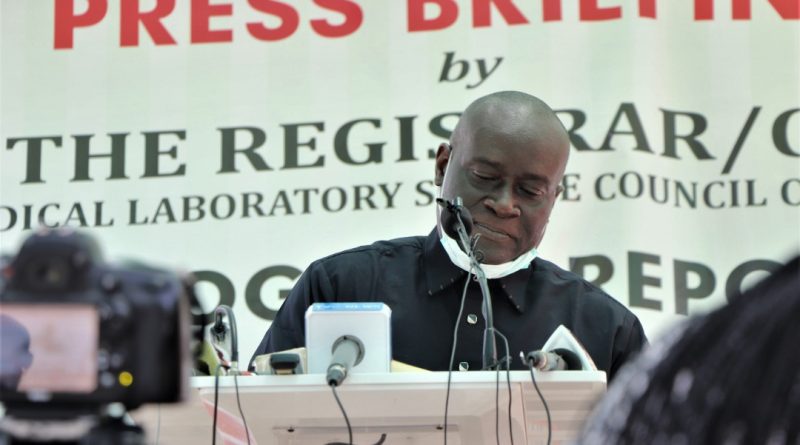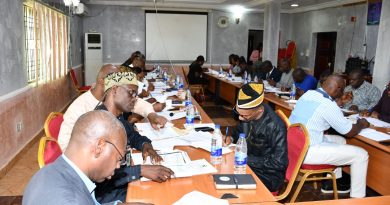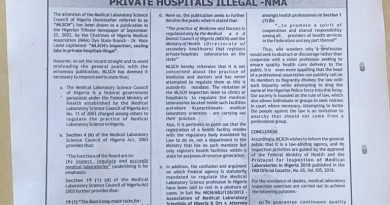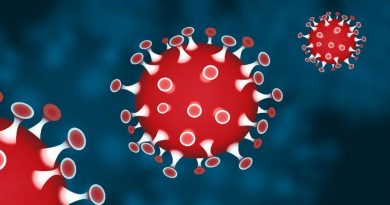MLSCN press briefing on the progress report of pre-market validation of SARS-CoV-2 infection (COVID-19) Rapid Test Kits (RTKs) in Nigeria and unveiling of guidelines for private Medical Laboratories seeking to provide COVID-19 testing on Friday, May 29, 2020.
Preamble:
The Medical Laboratory Science Council of Nigeria (MLSCN) in line with its statutory functions as stipulated in Act 11 of 2003 (CAP M25 LFN 2004), section 4 (b) and (e), which mandates MLSCN to regulate Medical Laboratory Science Practice in Nigeria as well as regulate the production, importation, sales and stocking of diagnostic reagents, equipment and chemicals respectively is providing information to the public on its regulatory functions.
- Progress report on Pre-market validation of SARS-CoV-2 Infection (COVID-19) Rapid Test Kits (RTKs).
- Unveiling of Guidelines for Private Medical Laboratories seeking to provide COVID-19 testing through completely private arrangement.
Firstly, let me give update on the Pre-market validation of SARS-CoV-2 Infection (COVID-19) Rapid Test Kits (RTKs).
Consequent upon the placement of an advert by MLSCN in four National Daily Newspapers on the 30th March, 2020 requesting for the submission of COVID-19 test kits by manufacturers or their sales representatives in the country for the purposes of validation. A total of eleven (11) In-Vitro Diagnostics; one (1) Polymerase Chain Reaction based kit, nine (9) Rapid Test Kits (2 Antigen based and 7 Antibody based kits) and 1Viral Transport Medium (VTM) were received for validation at the MLSCN Public Health In-Vitro Diagnostics Control Laboratory, Yaba, Lagos, Nigeria. However, out of the seven (7) Antibody based RTKs submitted for validation, only 4 of the RTKs met validation inclusion criteria. The validation of the PCR based kits and Antigen based Rapid Test Kits are ongoing.
Goals and Objectives of the Validation of Rapid Test Kits:
Goals:
To validate the laboratory performance characteristics of Rapid Test Kits using Real-Time-Polymerase Chain Reaction method as reference standard for the detection of SARS-CoV-2 infection.
Objectives:
The report addressed the following specific objectives:
- To determine the sensitivity and specificity of the kits
- To determine the accuracy of the test kits
- To determine the inter-reader variability of the test results of the kits
Results:
| Rapid Test Kits | Characteristics | Observed Performance (%) | Generally Acceptable Minimum (95% CI) |
| PRODUCT A | Sensitivity | 29.0 (22.6 – 37.8) | ≥ 95% |
| Specificity | 94.0 (83.5 – 98.7) | ≥ 95% | |
| Accuracy | 45.8 (39.0 – 52.7) | ≥ 95% | |
| PRODUCT B | Sensitivity | 51.4 (41.5 – 61.3) | ≥ 95% |
| Specificity | 81.6 (68.0 -91.2) | ≥ 95% | |
| Accuracy | 61.0 (53.2 – 68.5) | ≥ 95% | |
| PRODUCT C | Sensitivity | 22.1 (13.2 – 32.6) | ≥ 95% |
| Specificity | 90.2 (78.6 – 96.7) | ≥ 95% | |
| Accuracy | 49.2 (40.3 – 57.4) | ≥ 95% | |
| PRODUCT D | Sensitivity | 37.7 ( 26.9-49.4) | ≥ 95% |
| Specificity | 85.1 (71.7 – 93.8) | ≥ 95% | |
| Accuracy | 55.6 ( 46.8 -64.2) | ≥ 95% |
NOTE: PRODUCTS A, B, C, D ARE NOT THE BRANDED NAMES OF THE RTKs, THEY ARE USED FOR THE PURPOSE OF THIS BRIEFING. HOWEVER, THE FMoH HAVE THE COMPREHENSIVE REPORT.
Observations:
From the results above, the performance characteristics of four(4) COVID-19 Rapid Test Kits validated, fell below the generally acceptable minimum for In-vitro Diagnostics (IVD sensitivity and specificity of 95%). Therefore,none were approvedfor the purposes ofdiagnosis and surveillance in Nigeria.
It became clear from the standardized validation done by MLSCN, that the manufacturers’ claims as contained in the product insert about Sensitivity, Specificity and Accuracy are not always correct. In this case, we observed a significant standard deviation, an indication that Rapid Test kits that are not validated poses higher risks of providing false positive and negative results.
Comments:
Though, all the Rapid Test kits validated, fulfilled the requirement to perform laboratory test without the need of equipment and were able to produce results in less than twenty (20) minutes.
However, for a rapid test kit to be deployed for disease surveillance and diagnosis, it must be able to detect a disease-causing agent when it is present and to return a negative result if the causative agent is absent, i.e. it must possess good sensitivity so it can detect the presence of the disease and must equally have good specificity so that no interfering substances can lead to a false positive instead of true negative results in the absence of the etiological agent of the disease. Therefore, for a kit to be considered reliable for laboratory diagnosis and disease surveillance, the kit should have a high sensitivity and specificity. A kit performing very well in one of these characteristics without the other renders it unsuitable for diagnostic testing. It is also unsuitable if both characteristics are low.
The four kits in this report have not met the expected performance characteristics of sensitivity and specificity to qualify their deployment for the purposes of testing in disease surveillance and routine diagnosis.
MLSCN Validation Verdicts:
- The four (4) Rapid Test Kits validated so far, are NOT APPROVED for the purposes of diagnosis and surveillance of SARS-CoV-2 Infection in Nigeria. They are therefore NOT APPROVED for marketing in Nigeria.
- No SARS-CoV-2 Rapid Test kit is currently approved for use in Nigeria.
- We are using this opportunity to caution against the use of any non-validated Rapid Test Kits for COVID-19 testing in Nigeria as this will attract sanctions in accordance with the law.
Secondly, let me also use this opportunity to unveil the Guidelines for Private Medical Laboratories seeking to provide COVID-19 testing through completely private arrangement. This guidance document has been developed by MLSCN in collaboration with NCDC, to guide engagement with the private sector medical laboratories to help accelerate the availability of COVID-19 diagnostic testing for the duration of the public health emergency in Nigeria. For these private medical laboratories, providing a public sector function, NCDC and its partners will continue to support the provision of reagents and consumables so that testing is conducted at no cost to the patient. Prospective Private Medical laboratories for COVID-19 testing must be granted approval by MLSCN in collaboration with NCDC in accordance with this Guidelines. However, those not granted this special approval and proceed to conduct COVID-19 testing, will be considered to have contravened the provisions of Section 4 (h) of MLSCN Act – “Medical Laboratories Regulations for Inspection, Approval, Monitoring and Accreditation” and will be sanctioned in line with the provisions of the said Regulation. These guidelines are available on MLSCN website www.mlscn.gov.ng. Please be properly guided.
Conclusion
The validation of other Rapid Test Kits for SARS-CoV-2 Infection is ongoing, as Nigerians will be informed when suitable test kits meet minimum validation requirements. MLSCN assures the Federal and State Ministries of Health and indeed the government of Nigeria of its commitment to ensuring quality healthcare delivery as enshrined in the statute books.
Dr. Tosan Erhabor
Registrar/CEO




